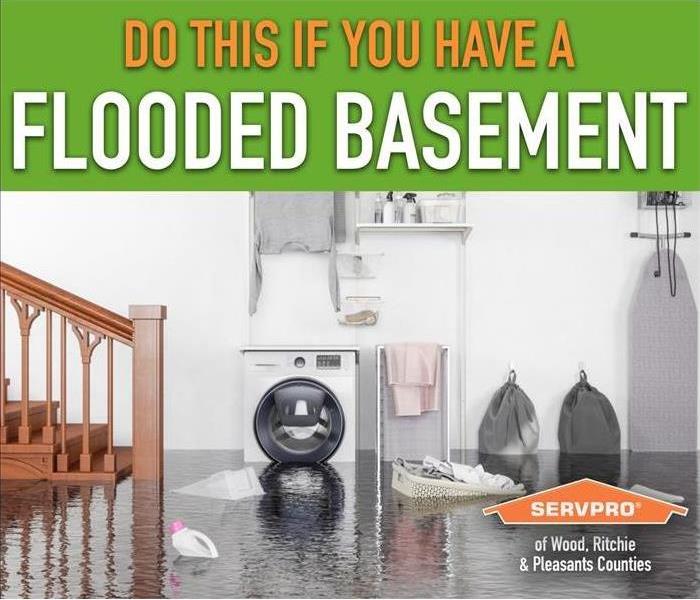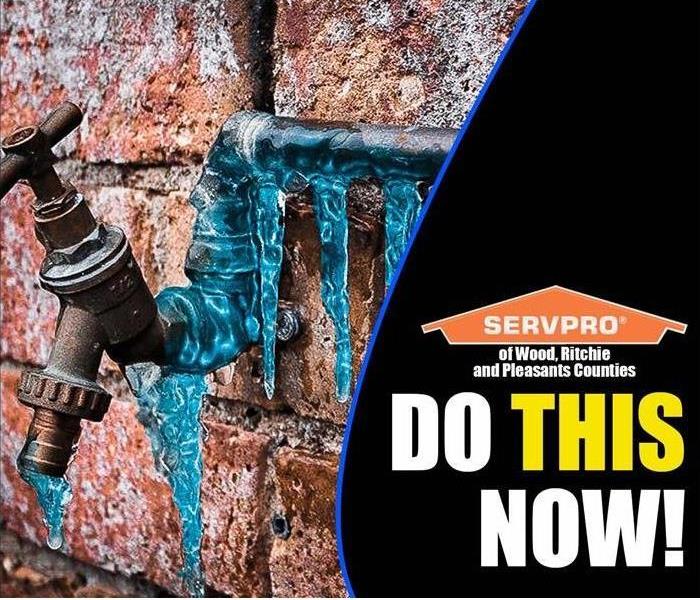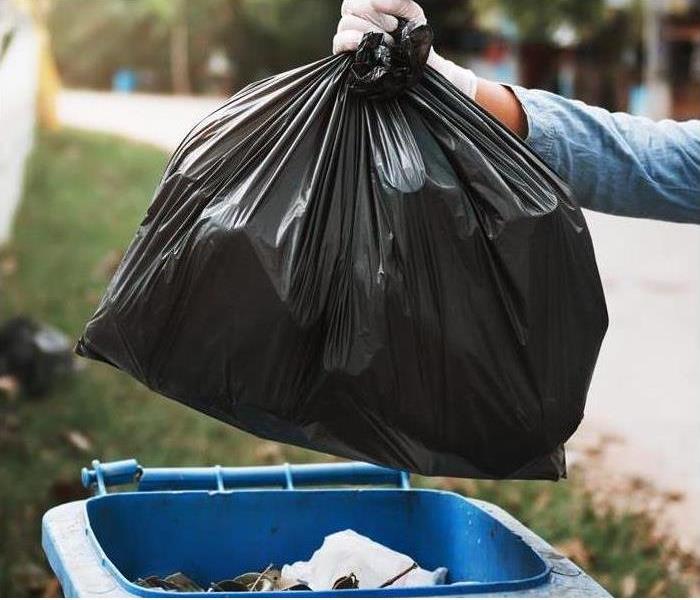Recent Posts
4 Steps if your basement floods
9/6/2023 (Permalink)
Article at a glance:
- Common causes of basement flooding
- What to do if your basement floods
If the worst case does happen, what can you do to save thousands in water restoration and keep your family safe? Follow SERVPRO’s simple guide to keep your belongings and family safe.
4 Things To Do When Your Basement Floods
- Shut Off Electricity - Shut off electricity immediately. Not only will this keep your family safe, but will save you thousands in appliance replacement once the water has been cleared. SAFETY TIP: If you are wet or in water, DO NOT attempt to turn off the electricity because this is an electrocution risk. Remove yourself and anyone else from the premises and wait for emergency services.
- Find The Source - If it is safe to do so, enter your basement in protective clothing and locate the source of the flooding water. This might be an open window, or clogged drain.
- Start Removing The Water - If the damage is minimal, begin removing water with towels or a wet vacuum. This will help remove the bulk of the water, and fast track you to removing excess moisture in your basement.
- Get The Air Moving - Once the water has been removed, and flooding has stopped, open windows and doors to begin circulating air through your basement. This will help remove any leftover moisture, and stop any further damage to your belongings.
We hope that this has helped and you have found value. If you have any further questions regarding professional water removal and water damage restoration please call us on 304 428 7378 or click here to contact us.
The Team at SERVPRO of Wood, Ritchie & Pleasants Counties.
Read Further:
How to Check Your Sump Pump (SERVPRO owner’s sump pump almost didn’t work!) - Video
Shave Thousands Off Your Storm Bill
Frozen pipes could cost $1,000's in damages!
9/6/2023 (Permalink)
As winter rolls out SERVPRO is called because West Virginian families have sustained water damage in walls or even flooding because of a frozen spigot. This can cost anywhere from a few thousand dollars up to tens of thousands of dollars in restoration fees.
3 PRE-CAUTIONS TO DO BEFORE WINTER HITS
- Disconnect your hose: Do this step in Fall. If you’re reading this after, do it now! When a hose is connected it holds a small amount of water and this water freezes and expands in the hose, blocking it. This can cause a leak or even a burst pipe down the line.
- Use an Outdoor Faucet Cover: This is the next step and a lesser thought of one. Disconnecting your hose is one thing, but does not make your spigot winterized just yet. Most hardware stores supply outdoor faucet covers and are relatively inexpensive. A small step to take, a large headache avoided.
- Install a Frost-Free Faucet: This is the more permanent solution of the three and a highly recommended one. As the name suggests, this is a faucet designed to survive in freezing conditions. HOWEVER: it is still very important that you disconnect your hose during the Fall. While the frost-free faucets are a great solution, they are not 100% fail-safe. The water trapped in the hose can still be at risk of freezing, expanding and ultimately damaging the faucet, or creating further water damage.
WHY DOES THIS EVEN MATTER?
When the tip is frozen it creates a blockage. When any water tries to flow through the pipe it builds up and can burst a pipe, flooding the walls, the basement or anywhere else the pipes lead through the home.
WHEN DO THESE BURSTS OCCUR?
They can happen in the winter or leading into spring. When this happens it is common that the family does not notice the problem until Spring! Weeks to months later. Which means that any water damage has become much, much worse. Yes, this means more money for remediation. So please, do not forget to disconnect your hose.
Watch THIS video:
Watch this short, informative video that will illustrate the where the water causes the most damage.
Click here to watch
Keep safe and enjoy the holidays!
The Team at SERVPRO of Wood, Ritchie & Pleasants Counties
Items That Need Thrown Away After Fire Damage
9/6/2023 (Permalink)
Items To Throw Away After a Fire
Recovering from a home fire is a long, frustrating process. When you face the destruction of the furnishings and cherished items of your West Virginia home, it can be hard to say goodbye to belongings that don't seem to have been affected. However, there are some items that need to be thrown away, even if they don't look like they've been damaged by fire or smoke.
1. Food
You’ll need to toss out anything that was laying on the counter. (Bread, cereal, etc) Of course, you'll throw away anything in open containers and foods there were stored in cardboard or thin plastic bags. It may surprise you to learn, however, that even your canned foods should be tossed out. This is because the high heat of the fire will activate the growth of bacteria, even when food is sealed in glass jars and cans from the store.
The items in your fridge may be safe, even if the power has gone out, but remember that it's always safer to throw out questionable foods than to suffer through physical sickness. Anything that smells smoky or odd has visible soot, or doesn't feel cold should be tossed.
2. Medicine
The last thing you need after a fire is to be left without the medications that you need. But these items can be affected by fire damage. If there's charring, or signs of soot or warping go ahead and throw it out. It's better to contact your doctor for refills than to become sick or suffer any other side effects.
3. Cosmetics
Inspect your cosmetics that were near high heat for soot, dust, chemicals, and signs of damage. If anything is warped due to the exposure to heat, toss it. Stay on the safe side and simply get rid of all medicine and cosmetic items.
4. Clothes
Some of your clothes might be able to be cleaned and disinfected by a fire restoration company that has the proper tools and knowledge and experience. Anything that is burnt needs to be thrown away. Baby and children's clothing need some extra care and attention as you don’t want to risk your little one’s health.
Always use caution with the above items after a fire. It might be smart to just throw away food, medicine and cosmetics, and some clothes for the sake of your health. Always keep in mind that items exposed to high heat could affect your health if you keep them. If you’re questioning anything after fire damage, feel free to give us a call here at SERVPRO of Wood, Ritchie & Pleasants Counties. We are always happy to help.
304-428-SERV
5 Things In West Virginia Storms to Be Aware Of to Avoid $1,000's in Damages
7/4/2023 (Permalink)
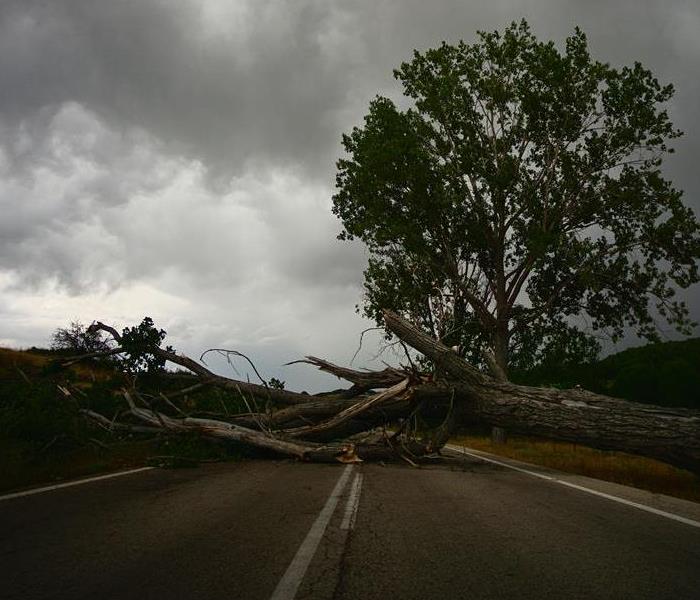 How to prevent $1,000's in damages
How to prevent $1,000's in damages
Beware of Trees Near Your Home
Are there any large trees near your home? If they fell would your home be in potential danger? If heat lightning struck would your home be in danger of the tree being on fire?
These are all very important questions to ask right now because it can be dealt with now. Remember: it’s easy to do it now. It will be harder to deal with it when it’s lying in your living room.
Call a local arborist (tree surgeon) to evaluate the likely danger and they can help you with the best line of attack. Here are a few in the local Parkersburg Area:
Nova Tree Solutions, LLC (Parkersburg & Vienna, WV)
Kiddler’s Tree Services (Marietta, OH)
Are There Any Areas That Could Create Major Leaks?
Water is a very invasive liquid that easily causes tens of thousands of dollars worth in damages within no time. Water damage can be very frustrating because it lingers. It seeps into furniture, walls and carpets, and unless eradicated professionally it can open up breeding grounds for mold.
What to do:
Conduct a proper check of your home. Are there any areas in the roof that may be a high risk of leaking and leading to attic flooding (which can lead to ceiling damage and other structural damage)? Are there any areas around the edges of your home that may result in a basement flooding?
You can either do this on your own, or ask a professional to come and look. A professional will know what to look for, because sometimes all that is needed is a small crack that can turn into a large hole after a storm.
Power Outages
This is a common one that most of us are prepared for and thankfully not a major one of concern.
What to do:
Basically; be prepared. Have some flashlights, food and warm blankets on the ready.
Move all Loose Items and Furniture Inside
If there is a storm warning please do this immediately. We cannot tell you how many times we are called out after a storm because something small has blown through a window or wall of a family home or business. Hundreds, if not thousands of damage from water damage and/or broken items that could have been easily avoided.
What to do:
Please, immediately move all these item indoors, away from wind.
Have the Proper Insurances
Prevention is always better than cure. We agree, at times a lot of people don’t like “the insurance companies” but they’re so important to stick on the side of caution: “it’s better to have it and not need it, than to need it and not have it.”
Everything is a risk verses reward system in this world and there are risks to our homes that (statistically) are more unlikely to happen than to happen. But the question of “what if” is always there.
We at SERVPRO always urge our community to lean towards being safer. Lean towards risk reduction because we see what happens when families are not prepared for the worst. It can be devastating.
What to do:
Investigate all insurance companies and their various policies. You can reduce your premium by increasing your excess for example.
It’s very important that you know all the aspects of your insurance as well. Some contain exclusions that may effect you and if the time comes that you need to claim, you do not want to be under an exclusion clause. Please be careful. There’s risk in not having insurance, but also risk in having the wrong insurance.
We hope that this has helped shed some light into the importance of preparing. Because prior preventions prevents poor performance (outcomes). Reduce the risk and enjoy the rewards it brings.
Stay safe,
The Team at SERVPRO of Wood, Ritchie & Pleasants Counties
Available areas include Parkersburg, Vienna, Harrisville, St. Mary’s, Williamstown, Pennsboro, Belmont and the wider Mid-Ohio Valley.
5 Tips to avoid Fires in the Fall
9/6/2022 (Permalink)
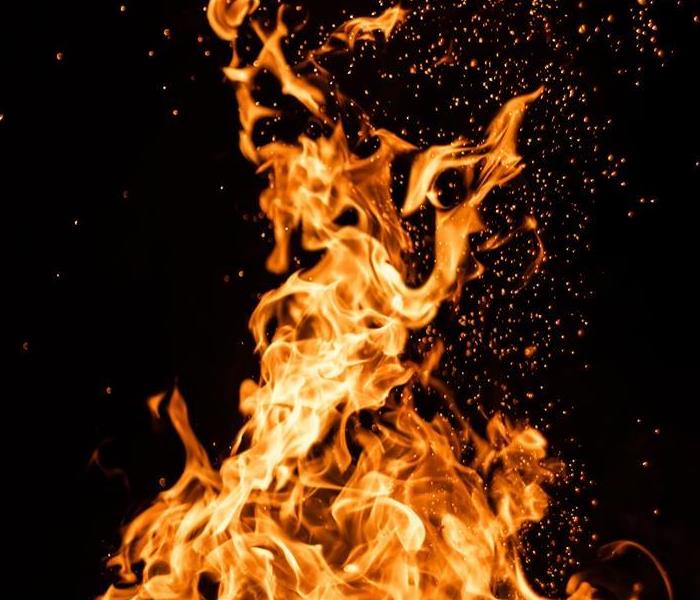 Fire Coming from the Ground.
Fire Coming from the Ground.
1.Be sure you are at least 25 feet away from structures or anything else that can burn before building a fire. Choose an open, level location and clear away any dry leaves and sticks, overhanging branches and shrubs.
2.Never use gasoline, kerosene or any other flammable liquid to start a fire. Instead, use a match or lighter to ignite tinder (small twigs and dry leaves); add larger sticks and pieces of dry wood.
3.Keep the fire small and controlled, and never leave it unattended.
4.Do not stand too close to the fire or play around it, and do not attempt to jump over it. Keep an eye on children and pets so they don’t get too close to the flames either.
5.Check that any decorative lights have been tested for safety. Examine each set of lights for broken sockets, frayed wires or loose connections, and discard any damaged sets. Be careful not to overload sockets when plugging in lights and other electronic decorations.
4 Tips to avoid Fires during Halloween
9/6/2022 (Permalink)
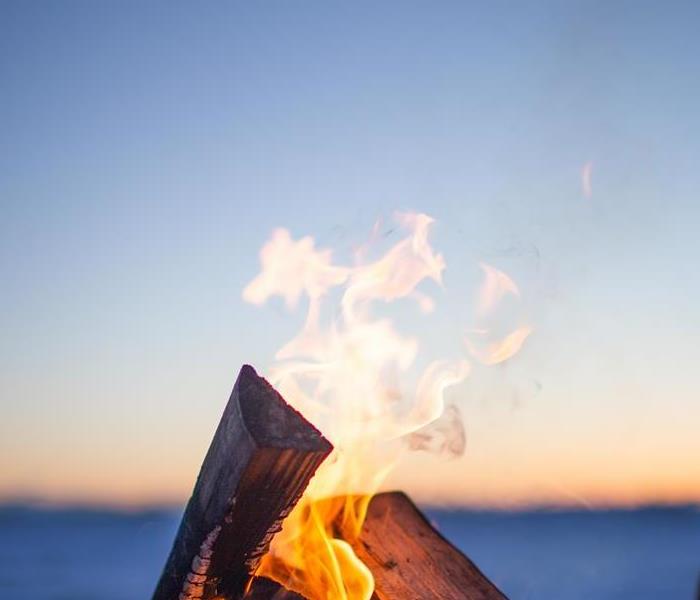 Small Fire with 3 pieces of wood.
Small Fire with 3 pieces of wood.
1. Consider glow sticks or battery-operated candles instead of real candles when lighting your jack-o’-lanterns or other luminaries. If you do use real candles, light them with long, fireplace-style matches or a utility lighter. Keep lit decorations off of doorsteps, yards and sidewalks where excited trick-or-treaters may knock them over.
2. Check that no decorations are blocking your home’s exits or pathways, so you have a clear escape route in case of an emergency.
3. Avoid costumes with loose, trailing fabrics or other hanging parts, which can catch fire on open flames. Check the labels on costumes, wigs and props to be sure they are made with flame resistant or retardant materials.
4. Practice the “stop, drop and roll” technique. “This is a great time of the year for adults to teach children about fire safety, as well as first aid measures if someone gets hurt,” Hultman says.
Leading Causes of House Fires & How to Avoid Them
9/6/2022 (Permalink)
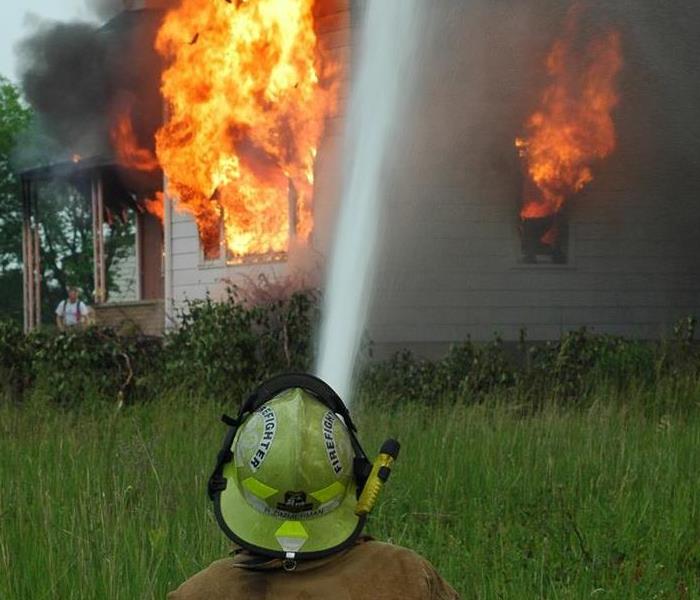 A House fire being put out.
A House fire being put out.
1. Electrical systems and equipment
- Have your home inspected by a qualified electrician, especially when purchasing an older home.
- Use a qualified electrician when having electrical work done.
- Watch for the warning signs of faulty wiring. These can include blown fuses, visibly damaged wiring, discoloration around outlets, flickering lights or burning odors.
- Protect your home against arc faults. An arc fault occurs when an electrical short produces an arc: intensely hot sparks that can set fire to nearby flammable materials. Arcs often happen in appliance or extension cords that have become frayed or cracked.
- To prevent arc faults, have Arc Fault Circuit Interrupters (AFCIs) installed in your home. These devices look and work like conventional circuit breakers. When an AFCI detects an arc, it shuts off the circuit.
- Power surges can damage appliances and even cause fires. Protect your home with a two-tiered surge protection system: a whole house surge protection device (SPD) on the main electrical service to the home, and point-of-use SPDs for all valuable electronics and appliances.
- Smart sensor devices can help detect the invisible dangers lurking in your home.
2. Heating equipment
- Consider replacing older space heaters with new ones that turn off automatically when overheated or tipped. Keep them at least three feet away from anything flammable.
- Have furnaces and chimneys professionally cleaned and inspected every year.
- All fireplaces should have a sturdy screen. Never use flammable liquids to start a fire in a fireplace. Allow ashes to cool completely and use a metal bucket for disposal.
3. Cooking fires
- Be alert. If you are sleepy or have consumed alcohol, don't use the oven or stove.
- Stay in the kitchen while you are frying, grilling or broiling food. If you need to leave the kitchen for even a short period of time, turn off the oven or stove.
- If you are simmering, baking, roasting or boiling food, check it regularly. Remain in the home while food is cooking, and use a timer to remind you that you are cooking.
- Keep your stovetop clear of anything that can catch fire, including oven mitts, wooden utensils, food packaging, towels or curtains.
Tips on Preventing Winter Storm Damage.
9/6/2022 (Permalink)
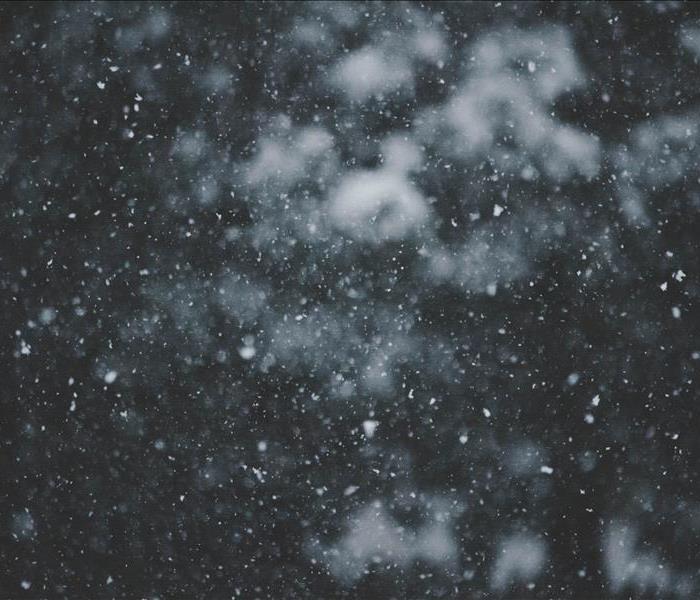 Snow falling to the ground.
Snow falling to the ground.
Every year, winter weather can lead to frozen and burst pipes, ice dams, power outages and other damages that can result in very costly and disruptive claims. By taking proactive steps today you can help prevent a loss before it can occur & give yourself peace of mind.
1. Remove any snow with a roof rake.
2. Install gutter guards to prevent debris interfering with draining water away from the house and into the ground.
3. Install heating cables with thermostatic control for your gutters. Turn them on during freezing weather so the water drains away from your home.
4. Trim trees and remove any dead branches, Ice, snow and wind could cause weak trees of branches to break and cause damage to your property or injure someone.
5. Turn off exterior faucets from the inside of your home and drain the remaining water from the pipes to prevent exterior faucets from freezing.
8 Tips To Prevent Water Damage at Your Business
8/16/2022 (Permalink)
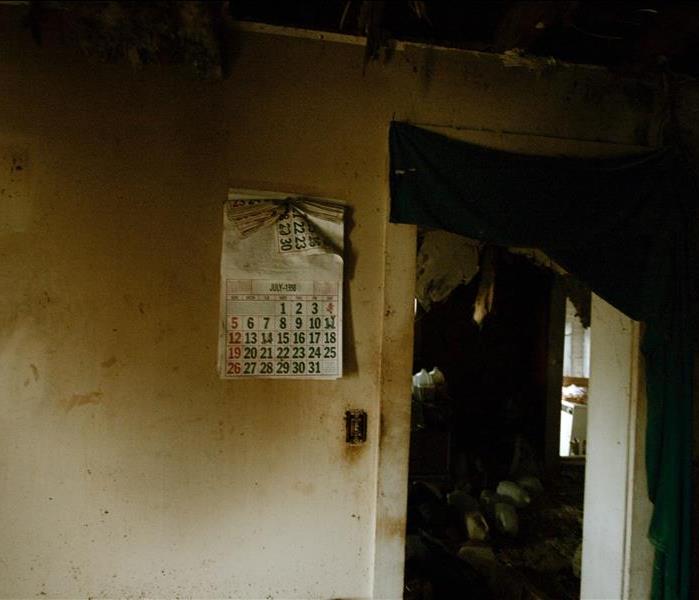 Preventing Water Damage at Your Business.
Preventing Water Damage at Your Business.
8 Tips To Prevent Water Damage at Your Business:
Tip #1: Seal Cracks & Gaps
Seal any cracks or other gaps in your building’s exterior & foundation to keep cold air from entering the building.
Tip #2: Insulate any Exposed Pipes
Exposed pipes are vulnerable to freezing when the temperature drops in the winter.
Tip #3: Keep Heat At The Correct Levels
To prevent pipes from freezing, you’ll want to keep an eye on your business’s thermostat.
Tip #4: Inspect Gutters & Drainage
Regularly inspect your business’s gutters, downspouts, & remove any debris or buildup.
Tip #5: Clear Your Roof
Snow and ice accumulation on your business’s roof can result in weakened roofing materials and prevent melted ice and snow from properly draining.
Tip #6: Maintain And Inspect Your HVAC & Sprinkler Systems
HVAC, plumbing, and sprinkler systems are leading causes of loss in commercial buildings. So maintaining & inspecting them is key.
Tip #7: Locate Your Shut-off Valve
You should know the location of the main shut-off valve for your building’s water supply in case of an emergency.
Tip #8: Keep Track of Valuable Items
Knowing the value of items in your building will help you replace them in the event they’re damaged by a water-related incident.
SERVPRO Attends The Veterans Parade at Freedom Festival
7/9/2022 (Permalink)
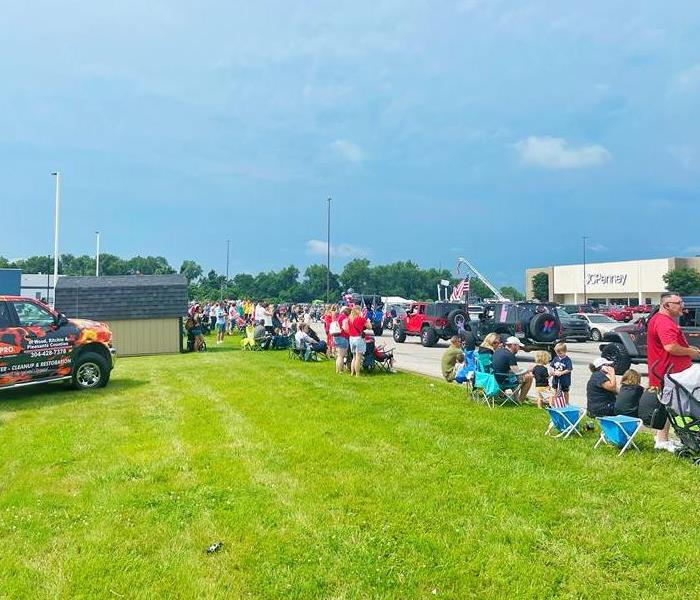 SERVPRO had the honor of attending the Veterans parade.
SERVPRO had the honor of attending the Veterans parade.
SERVPRO attended the Veterans Parade at the Freedom Festival in Vienna, West Virginia. We had our booth setup right in front of the main part of the parade.
This was the return of the Freedom Festival after a long hiatus. The general public enjoyed it a lot as it included the display of our veterans, first responders, local dance groups, & a long line of Jeeps decorated celebrating July 4th.
This was the very first event of the day at Freedom Festival 2022. We would then go on to have a large amount of giveaways at our booth throughout the day including: tshirts, backpacks, balloons, beachballs, hand sanitizer, & many more.
We also went down to Spencers Landing and assisted with the Hot Air Balloon Rides that lasted from 6pm-10pm.




 24/7 Emergency Service
24/7 Emergency Service
